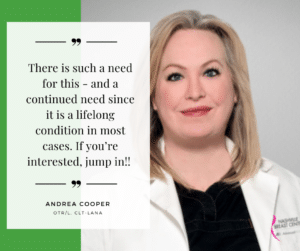For several years, I co-facilitated a support group in Nashville that brought patients, therapists, and caregivers together for shared learning and community. Titled “The Nashville Lymphedema/Lipedema Empowerment Group”, it was started at the instigation of a patient of mine, Larkin Oates, who is a psychotherapist and who recognized the need for such a group in our area. As I myself am a Lymphedema therapist with Lymphedema, she felt that partnering with me would be ideal.
Our goal was to provide a local resource for sharing new insights participants had learned at conferences and courses with those who were interested, to answer questions from those challenged with lymphatic dysfunction, and to provide a gathering where patients, family and providers could support one another.
Occupational Therapist (OT) and Certified Lymphedema Therapist (CLT) Andrea Cooper was one of the providers involved from the beginning, and a very active participant, so when Larkin’s life changed in ways that prevented her continuing to share the organizational and facilitation duties, Andrea generously stepped up to partner with me. Although the group has been in hiatus for a year or so now, the need to share the ever-expanding knowledge of lymphatic disease and dysfunction is great, and we hope to restart our meetings soon.
In the meantime, Andrea has been a wonderful collaborator in several projects, and we are excited that she represented AIROS Medical at the American Cancer Society Lymphedema Summit in St. Louis in October. We will be sharing Andrea’s review of that event in a later post, but for now, I am delighted to introduce my friend to all of you!
ADIE: Andrea, I met you here in Nashville, Tennessee. Where did you grow up?
ANDREA: I’m originally from Birmingham, Alabama, but we moved to Germany when I was in elementary school and I was lucky enough to live there until my early 20’s. It was kind of magical being exposed to so much history and getting to travel all over Europe. I should have appreciated it more.
ADIE: What a fortunate opportunity to learn in an international setting! My husband, too, lived in Germany during his teens and it was a very beneficial experience to him. How did you come to be aware of lymphedema?
ANDREA: My mother had lymphedema in both of her feet and ankles even before I was born, so I never knew her without lymphedema. I remember her not being able to wear shorts and skirts because she was very self-conscious about it. And I remember that she always wore her compression hosiery and socks – and was adamant that she couldn’t even get out of bed before having them on. It was a daily chore for her that she felt like we couldn’t really understand. And she was definitely right.
ADIE: So, what led you to become an Occupational Therapist? How long have you been doing this?
ANDREA: I started off my career as an accountant in the medical field and actually did that for several years. Then my mother was in a terrible car accident and had to go to rehab for months to learn how to walk and do everything again. I would go hang out with her during her therapy sessions and was intrigued by her OT/PT treatments. I thought it seemed like more fun than staring at spreadsheets all day. So, I applied for the Masters of Occupational Therapy program at the Ohio State University and here I am! I have been an OT now for 16 years.
ADIE: I think a lot of us have stories like that, the personal experiences that lead us to a career in caring for others. I can see why you might have been drawn to become a CLT; when did you decide to get that certification? Where and when did you train for this?
ANDREA: I’ve worked with many different population groups as an OT, but always wanted to specialize in something. My mother had passed away and it just felt like a way I could honor her because of how much she had struggled with her condition. I attended an Introductory Lymphedema course at a Rehab Summit with Carmen Elliott from Monarch and I loved her and the course, so I completed the full 150 hour training and certification through Monarch shortly after that. I became certified by the Lymphology Association of North America (LANA) one year later.
I completed my lymphedema training about 10 years ago. For the first year following certification, I worked in a facility that provided inpatient, outpatient, and home health therapy services for multiple types of injuries – so I would provide lymphedema treatment on an as-needed basis. I then heard about a position working exclusively with breast cancer patients and moved into that role.
ADIE: Of course, there is such a need to provide care and education for those dealing with Breast Cancer! I wish all BC clinics had a CLT on staff! I know about your work setting and have consulted with a surgeon in your clinic. But please tell us more about your work setting, and describe your job, your patients, etc.
ANDREA: I have been working at the Nashville Breast Center for the last 9 years. This is a physician owned practice which has now grown to having three breast surgeons on staff. They provide breast cancer screening, diagnosis and surgical treatment. Dr. Pat Whitworth, breast surgical oncologist and founder of the practice, recognized many years ago the importance of screening for and treating lymphedema, and so he took the extraordinary step of actually hiring a lymphedema therapist to work directly in his office in order to serve his patients. We follow a lymphedema surveillance model and so I see all patients with a diagnosis of breast cancer and planned lymph node dissection and/or radiation, both prior to surgery, and then at consistent intervals following surgery. I provide lymphedema education and screening -using both traditional and newer methods (eg, bioimpedance analysis), as well as treatment for lymphedema if it arises. Our goal is to reduce the risk of lymphedema developing and/or progressing by empowering patients to recognize early warning signs and providing treatment early.
ADIE: That approach is such a benefit to your patients! What do you enjoy most and least about the work?
ANDREA: I obviously love our patients and feel like I have met the most amazing and resilient people in this position. Over the years that I’ve been with the Nashville Breast Center, I’ve also come to realize how many other side effects there are to breast cancer treatment (lymphedema being just one of many) and love being able to walk with patients through the entire journey of surgery, chemotherapy, radiation, and into survivorship. To watch someone come out restored on the other side. It has really been one of the great joys of my life. What isn’t fun is having to walk with them through the pain and the discouragement of setbacks. I wish we could get rid of that part.
ADIE: I’m sure that your support really helps the patients deal with those setbacks and challenges. How do you find personal restoration? What kinds of activities do you enjoy outside of your work?
ANDREA: I like to travel and spend a lot of time thinking about trips and planning trips. Probably more than actually going on trips. I’ve also recently become a caregiver for my father and have discovered the fun of going on Sunday drives – finding cool little towns, coffee shops, and pretty scenery.
ADIE: I’d love to hear about your career goals for the future.
ANDREA: My dream would be to help other cancer clinics (surgical practices, oncology clinics, etc.) learn how to establish in-house rehabilitation and lymphedema screening programs such as the one we have at the Nashville Breast Center. It is a huge benefit to the patient and there is such an extreme need for this type of service in the cancer population.
ADIE: May that dream come true! What a benefit to others that will be. Do you have any advice for those who are interested in treating lymphedema, or who are looking for an area of specialty in Occupational Therapy?
ANDREA: We need you! Even in Nashville where we are so lucky to have many excellent therapists, we could still use more. There is such a need for this – and a continued need since it is a lifelong condition in most cases. if you’re interested, jump in! We need you.
I completely share this sentiment that Andrea expresses and encourage any health care professionals to consider becoming a Lymphatic therapist! With increasing understanding that lymphatic dysfunction is a component of most if not all disease, there will be increasing need for therapists to treat these conditions and to help the science move ahead! It is so rewarding, as Andrea has outlined here. If you have any comments about this article or questions about how to get started on this career track, please reach out to me anytime at amackenzie@airosmedical.com. I am eager to help!

